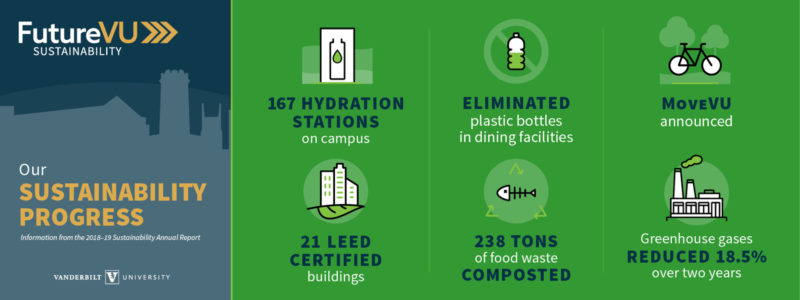
Vanderbilt University greenhouse gas emissions have dropped 7 percent per square foot compared to FY17-18, and 18.5 percent compared to calendar year 2016. The findings are among those showcased in the annual sustainability report released today by FutureVU Sustainability in the Division of Administration.

“The achievements highlighted in this report reflect the work of hundreds of faculty, staff and students in the Vanderbilt community,” Director of the Sustainability and Environmental Management Office Andrea George said.
“It clearly demonstrates that collaboratively working together towards the university’s carbon neutrality goal can help us make substantial progress. While we have made impressive strides during the last year, there is still much work to be done. We want to change the culture around campus and each member of the Vanderbilt community can help do that,” she said.
View the FY18-19 sustainability annual report. >>
On Earth Day 2019, Vanderbilt unveiled a comprehensive long-term strategy to significantly reduce its environmental footprint in part by powering its campus entirely through renewable energy, putting the university on track to be carbon neutral by 2050. Tracking and reporting on the university’s greenhouse gas (GHG) emissions and other sustainability programs allows Vanderbilt to measure progress each year towards this goal.
The university’s GHG emissions are split between three primary sources: 43 percent from the on-campus power plant’s natural gas use and individual buildings, 24 percent from electricity purchased from Nashville Electric Service and 33 percent from commuting, air travel, recycling and waste disposal.
Earlier this month, Vanderbilt announced its commitment to achieving zero waste by the year 2030 as part of the university’s comprehensive long-term carbon neutrality strategy. The waste diversion rate, which tracks the amount of campus waste processed by recycling and compost programs, was 47.4 percent for FY18-19.
Vanderbilt has already invested in a suite of projects making a positive environmental impact including eliminating single-use plastic water and soda bottles in dinning operations, launching the Sustainability Leaders engagement program, earning three new LEED building certifications and redesigning Fleming Yard during FY18-19.